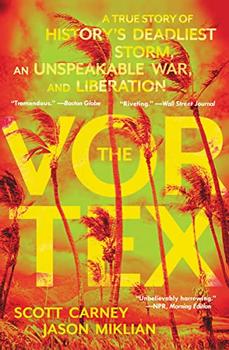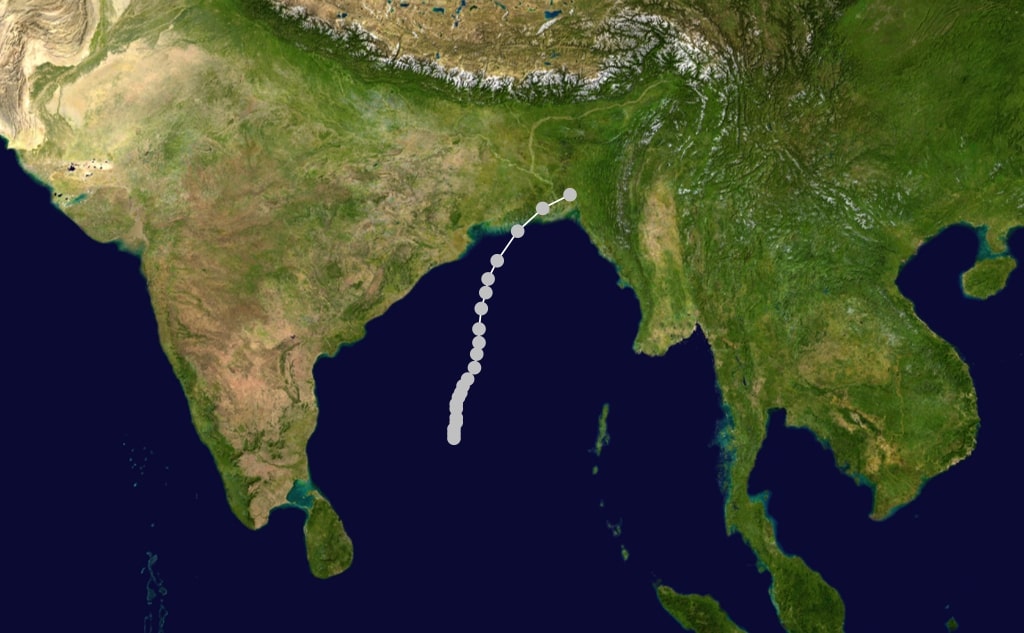Summary | Excerpt | Reviews | Beyond the Book | Read-Alikes | Genres & Themes | Author Bio
A True Story of History's Deadliest Storm, an Unspeakable War, and Liberation

Critics' Opinion:
Readers' Opinion:
First Published:
Mar 2022, 528 pages
Paperback:
Mar 2023, 272 pages
 Book Reviewed by:
Book Reviewed by:
Peggy Kurkowski
Buy This Book
This article relates to The Vortex
 In The Vortex, Scott Carney and Jason Miklian explore the environmental and societal impacts the 1970 Great Bhola Cyclone had upon South Asia, specifically what was East Pakistan (now Bangladesh). The tropical storm began brewing in the Bay of Bengal on November 8, 1970, gaining strength to eventually achieve winds of up to 140 mph when it smashed into the densely populated East Pakistan coastline November 12-13, 1970.
In The Vortex, Scott Carney and Jason Miklian explore the environmental and societal impacts the 1970 Great Bhola Cyclone had upon South Asia, specifically what was East Pakistan (now Bangladesh). The tropical storm began brewing in the Bay of Bengal on November 8, 1970, gaining strength to eventually achieve winds of up to 140 mph when it smashed into the densely populated East Pakistan coastline November 12-13, 1970.
No stranger to cyclones, this area averaged around two per year between 1959-1969. But it had never experienced anything on the scale of the 1970 storm. Along with the ferocious winds, a maximum storm surge estimated at 35 feet high swamped low-lying coastal fishing villages, drowning hundreds of thousands of people and livestock in one night. While the exact death toll will never be known, estimates range from 300,000-500,000 fatalities. It is currently the deadliest storm on human record.
But the deaths did not stop with the storm itself, as the widespread destruction wiped out crops and other food stores. The islands of Bhola, Hatiya and Manpura were among those most devastated, leaving many survivors with nothing but their lives, as the ferocious winds even ripped clothing off their bodies. At least 85% of homes were destroyed and food was scarce. Suffering from dehydration and hunger, survivors roamed the landscape, waiting for the central government in West Pakistan to send food and medical supplies. It was a waking nightmare as days and weeks passed with nothing more than lip service paid by President Yahya Khan to provide help (which never arrived). The harrowing experience of Mohammed Hai, devastatingly told in The Vortex, gives insight into those early days of utter hopelessness.
"Hai was numb. What they would soon call the Great Bhola Cyclone had obliterated every one of his senses. The next forty-eight hours were a blur, as two urgent tasks consumed him. First, they needed to bury both people and animals as quickly as possible. By his calculation, more than forty thousand of Manpura's fifty thousand residents were dead … Second, they had to figure out what the living would eat … Within days the survivors became scavengers, gnawing on anything that looked like it might be food … They had no word from off the island, no idea if help was coming."
The coastline of Bangladesh is unfortunately quite vulnerable to storm surge and the subsequent disastrous consequences, as are portions of Myanmar and India. According to the Weather Channel, this is due to several factors that include low elevation and dense populations, but also:
As The Vortex warns in its conclusion, climate change will only exacerbate these unfavorable conditions further. While acknowledging that "climate change probably didn't cause the Great Bhola Cyclone," the authors contend that "it's a harbinger of what climate change will bring in the future." Weather experts agree with this assessment, in that these areas will be prone to increased flooding as sea levels rise.
The sociopolitical impacts of these weather events cannot be understated, as climate refugees can worsen a country's destabilization. Indeed, wishing to avoid another Great Bhola Cyclone Muslim refugee crisis, in 1993, India began building a wall around Bangladesh, staffed by border guards with shoot-to-kill orders for anyone trying to cross. But there have been positive developments since the 1970 natural disaster. According to Carney and Miklian, Bangladesh is better equipped to deal with cyclones than ever before as "new satellites track storms, and warning systems and defensive concrete structures dot the delta."
As The Vortex makes clear, the domino effect initiated by a powerful storm upon a region's existing sociopolitical tensions could be mitigated by proper preparation and warning systems. But readers of the book might wonder, what systems will curtail the baser human instincts to capitalize on tragedy?
Path of the 1970 Great Bhola Cyclone, courtesy of Wikimedia Commons
Filed under Nature and the Environment
![]() This "beyond the book article" relates to The Vortex. It originally ran in April 2022 and has been updated for the
March 2023 paperback edition.
Go to magazine.
This "beyond the book article" relates to The Vortex. It originally ran in April 2022 and has been updated for the
March 2023 paperback edition.
Go to magazine.




It is a fact of life that any discourse...will always please if it is five minutes shorter than people expect
Click Here to find out who said this, as well as discovering other famous literary quotes!
Your guide toexceptional books
BookBrowse seeks out and recommends the best in contemporary fiction and nonfiction—books that not only engage and entertain but also deepen our understanding of ourselves and the world around us.